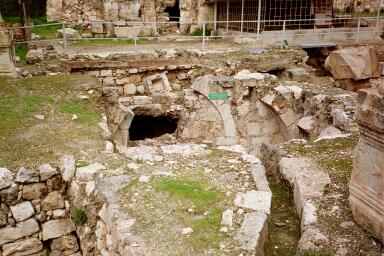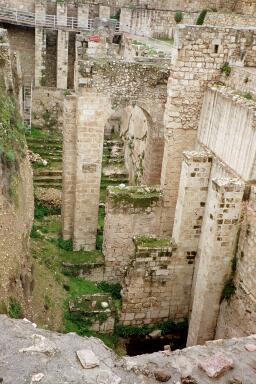Bethesda - and Healing
Reading: John 5.1-15
 St Anne’s Church is north of the Temple Mount. It is not far from where the Sheep Gate was located. An old tradition names Anne and Joachim as the parents of the virgin Mary.
St Anne’s Church is north of the Temple Mount. It is not far from where the Sheep Gate was located. An old tradition names Anne and Joachim as the parents of the virgin Mary.
We went through St Anne's Church to excavations from the late nineteenth century which led to the discovery of the Pool of Bethesda.
It is hard for us to realise the extent to which the flattening of Jerusalem by the Romans in 70AD changed the face of the city by filling in the hollows and covering significant Biblical sites in metres of rubble. That is certainly what the archaeologists had to face here. And the result, while almost certainly the correct site, doesn't look at all as it would have in the time of Jesus.
 The Pool of Bethesda is described in John 5.2 as being "surrounded by five covered colonnades." It would have had colonnades on all four sides, with the fifth colonnade across the centre, dividing it into two pools. It is believed that one of the pools was used for washing sheep brought to the Temple for sacrifice.
The Pool of Bethesda is described in John 5.2 as being "surrounded by five covered colonnades." It would have had colonnades on all four sides, with the fifth colonnade across the centre, dividing it into two pools. It is believed that one of the pools was used for washing sheep brought to the Temple for sacrifice.
Our guide explained that the rock is limestone. Water hollows it out. Evidently, water would build up in one of the hollows to a point where it was suddenly released, causing a periodic bubbling spring which the people believed to be caused by an angel. (A footnote in tells us that "some less important manuscripts" record the belief that an angel stirred up the waters. That is why the people came to seek healing. The Gospel record, however, is not endorsing that popular view.)
What a depressing sight it must have been – "a great number of people... the blind, the lame, the paralysed." All had heard the story of someone else who had received healing. All had believed the rumour, hoping that they might be the next.
But, of all the people there that day at the pool, Jesus only came to one man. He had been an invalid for thirty-eight years. "When Jesus saw him lying there and learned that he had been in this condition for a long time, he asked him, 'Do you want to get well?' " (John 5.6).
We would think of that as an obvious, almost insulting, question. Why else would he be waiting there? Weren't all the other folk wanting to get well too?
But when we hear the man's answer, we gain insight into Jesus' question – "Sir, I have no one to help me into the pool when the water is stirred. While I am trying to get in, someone else goes down ahead of me" (v. 7). Instead of saying a simple "yes", he complains that he is never able to get in first.
Years ago we lived in a small country town whose only doctor we found to be very good, though he had a somewhat abrupt manner. Some of the locals travelled to a neighbouring city an hour away to other doctors. In our doctor's words, "They go to other doctors when they think they are sick. But if they are really sick, they still come to me!"
At the Pool of Bethesda the people who "thought they were sick" were going away praising the curative power of the bubbling water - they were fit enough to get in first. Meanwhile, those who were "really sick" could never make it.
"Then Jesus said to him, 'Get up! Pick up your mat and walk.' At once the man was cured; he picked up his mat and walked" (vv. 8,9).
The healing occurred on the Sabbath day and the sight of a man carrying his mat through the city attracted the attention of the Jewish authorities. At first the man had no idea who had healed him.
"Later Jesus found him at the temple and said to him, 'See, you are well again. Stop sinning or something worse may happen to you.' The man went away and told the Jews that it was Jesus who had made him well" (vv. 14,15).
Jesus wasn't subscribing to the popular view of the time that linked sickness and personal sin. That is clear in Jesus' response to the disciples' question about a man born blind (9.2-4). Sickness comes from the general fallenness of humanity and may afflict any of us. However, in many ways our spiritual state can affect our physical condition. This seems to have been the case for this man.
Certainly, he was wrapped up in himself and his problems. He had gone past hope, past openness to healing and change. Jesus was concerned to make him whole - physically, emotionally and spiritually.
"Do you want to get well?" That's an important question. When we are open to God, he is ready and able to make us whole.
| PRAYER: Lord Jesus, you see past our pretences, our defences... You know the hesitation that centres on ourselves and our problems and fails to recognise your offered grace. Lord, make us whole. And enable us to bring your healing and hope to others. Amen. |
Wholeness
"Do you want
to get well?"
he asks.
Afflicted
all these years
with no one
to help me.
The water stirs -
another
gets in first.
These others here -
competitors
together,
losers
together.
Hope has brought us -
despair grips us!
"Get up
and walk!"
I cannot,
yet at his command,
new life
and hope
surge through me.
Now to walk
no more
in selfish
sinfulness
but in his way.
© Peter J. Blackburn, Burdekin Blue Care Devotions, 18 September
2001
More photos of Israel are available here.
Except where otherwise noted, Scripture quotations
are from the New International Version, © International
Bible Society, 1984.
Back to Sermons
 The Pool of Bethesda is described in John 5.2 as being "surrounded by five covered colonnades." It would have had colonnades on all four sides, with the fifth colonnade across the centre, dividing it into two pools. It is believed that one of the pools was used for washing sheep brought to the Temple for sacrifice.
The Pool of Bethesda is described in John 5.2 as being "surrounded by five covered colonnades." It would have had colonnades on all four sides, with the fifth colonnade across the centre, dividing it into two pools. It is believed that one of the pools was used for washing sheep brought to the Temple for sacrifice. St Anne’s Church is north of the Temple Mount. It is not far from where the Sheep Gate was located. An old tradition names Anne and Joachim as the parents of the virgin Mary.
St Anne’s Church is north of the Temple Mount. It is not far from where the Sheep Gate was located. An old tradition names Anne and Joachim as the parents of the virgin Mary.